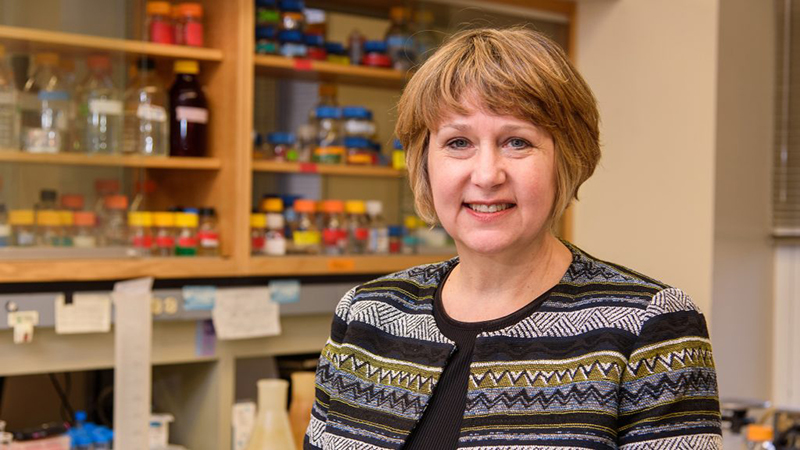
Three years ago, Lesa Beamer, PhD, was flipping through “The New England Journal of Medicine” and ran across a paper describing a rare inherited disease called phosphoglucomutase 1 deficiency.
Beamer, a professor of biochemistry at the University of Missouri, has spent much of her career studying the three-dimensional structure of proteins, including PGM1, which helps determine if glucose is stored in the body or burned as fuel.
“I almost fell out of my chair,” she said of her reaction to the paper. “It was kind of surprising for multiple reasons, at least to me, because I had assumed if people didn’t have an enzyme that worked correctly that they wouldn’t survive, because glucose metabolism is so important.
“We thought, ‘Wow, this is a great opportunity to get involved in it.’ The first thing we did, which is the normal thing you do in biochemical studies, is we recreated these mutant proteins in the lab and studied how they worked or didn’t work. Then the idea is: Is there anything we can do to fix these?”
Beamer’s goal is to find a molecule that will bind with the mutated PGM1 protein and help it fold correctly. She recently received an Institute of Clinical and Translational Sciences pilot funding award worth $50,000 that will allow her to test 14,000 compounds in the spring at Washington University’s High-Throughput Screen Center in St. Louis.
Between that large screening and a 2,000-compound screening — funded with a separate $5,000 grant — conducted on Dec. 21, Beamer hopes to find some promising hits that could eventually translate to a drug that would treat the disease. Access to the High-Throughput Screen Center allows Beamer to have large plates of compounds tested at the same time.
“Dr. Beamer’s work is a great example of translational research,” said Jerry Parker, PhD, the MU School of Medicine’s interim senior associate dean for research and co-director of MU-iCATS. “She will be using basic science tools and methods to seek a treatment for a challenging, inherited metabolic disorder. The MU Institute for Clinical and Translational Science is pleased to partner with Washington University to support Dr. Beamer’s innovative research program.”
MU-iCATS and its Washington University counterpart have been formal partners since August 2015. Together, they secure funding to support research that can translate into health care solutions.
Diagnosed cases are of PGM1 deficiency are extremely rare — the original paper identified only 19 patients — although Beamer suspects the actual number could be higher because doctors aren’t looking for it. The majority of people with the disease suffer from muscle weakness, growth retardation and hypoglycemia. Patients also can have liver and heart trouble and other developmental problems. Beamer is curious to learn how the defective enzymes may cause heart disease, as PGM1 is abundant in heart muscle.
If she gets good leads from the screenings, they will need to be retested. Then she hopes to move to the next step, working with cell-based assays through a collaboration with Tulane University’s Eva Morava-Kozicz, MD, PhD, who is also researching therapies for the disease and has access to cell lines from patients.
“Everybody knows that this is the beginning of the road in terms of drug development, but you have to do it before you can get to all the other work,” Beamer said. “Importantly, to get grants to do all the other work, you need to get this preliminary data. That’s the whole goal of this. The funding program, really, it’s not supposed to be the end. It’s supposed to be the first step.”





